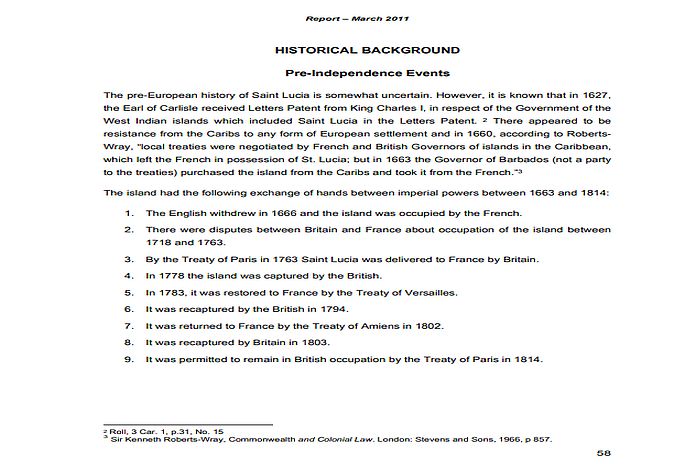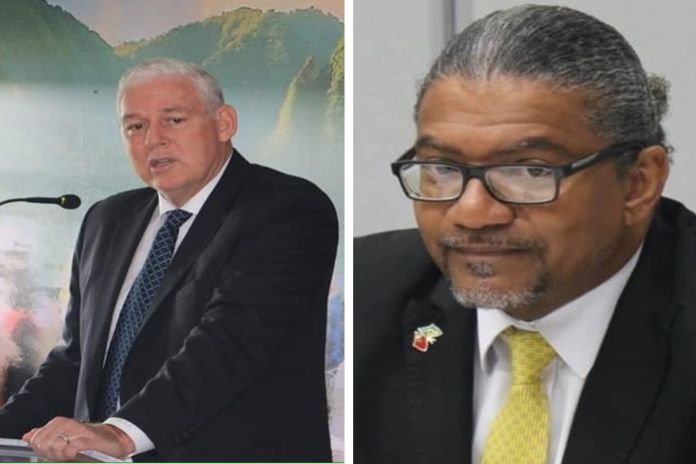By Caribbean News Global contributor
CASTRIES, St Lucia – On News Spin, with host Timothy Poleon, Wednesday, March 20, 2024, leader of the opposition, Allen Chastanet, announced that Mary Francis has resigned from the Constitutional Review Committee, […] and announced that “myself and Bradley Felix, thought that you had to be an MP [member of parliament] to be on it – and we both going to also resign from that committee,” Chastanet said.
Poleon enquired of opposition leader Chastanet: Why are you going to resign?
Chastanet, retorts:
“… How can that committee take it upon themselves to make recommendations or any parliamentary committee to make those kind of recommendations?
“You have a report that was done. Who is the person that is going to go legally and determine whether, in fact [that] those things are correct?
Leader of the opposition, Chastanet explained to Poleon and News Spinners:
“That can’t be the role of the committee to do that! Also, what we realised was that we misinterpreted, that’s our fault, we thought you had to be an MP to be on, and we saw, the other MP’s are not there.
“So, we don’t want to be involved – part of this process, am not so sure, and I know that the attorney-general has been written to as to whether in fact, this has the legal founding that he thinks it has. […] I don’t think that even from a practical perspective far-less legal, that this would be the way to go about changing the Constitution.
“The constitution needs to be reviewed. It’s a very good document if you follow it. But there are a lot of assumptions that are made in the Constitution that are not there.
“We are the ones who have to hold ourselves accountable for it not happening. We have to take these thing substantially more seriously. Those rules are there to protect us,” said opposition leader Chastanet. […]” — Listen here.
What is the progress following the discourse on Constitutional Reform, broadcast on NTN March 6, 2017?
Delivering Saint Lucia’s 42nd anniversary of independence and national address, Facing our greatest challenges: Part 1 – opposition leader Pierre, reiterated:
“ In improving our democratic institutions, a labour government under my leadership will undertake constitutional reform to reflect the hopes, ideas and aspirations of our people in a rapidly changing environment which is calling for greater accountability and better use of scarce resources.”

On March 6, 2024, the Constitutional Review Committee held its inaugural meeting, “the beginning of a collaborative effort to modernize the Constitutional framework of Saint Lucia, and deliberated on strategic pathways,” said a press release from the Office of the Prime Minister, (OPM).
The new committee chaired by Claudius J. Francis and deputized by Ignatius Jean, consists of 12 members, comprising nominees from the government, the opposition, and civil society representatives:
Claudius J. Francis (Chairperson); Ignatius Jean (Deputy Chairperson); Bradley Felix; Allen Chastanet; Everistus Jn. Marie; Earl Huntley; Catherine Sealys; Professor Cynthia Barrow; Maurice Compton; Nicholas John and Lenard Montoute.
The Constitutional Reform Commission (CRC) of Saint Lucia submitted its final report to the parliament and to the people of Saint Lucia – March 2011.
By unanimous resolution dated 17 February 2004, the House of Assembly of Saint Lucia authorised the establishment of a Constitutional Reform Commission (hereafter “the Commission”) to examine Saint Lucia’s Constitution (Saint Lucia Constitution Order S.I. 1901 of 1978) (hereafter “the Constitution”) and to report in writing, the Commission’s opinions and recommendations for possible reform of that same Constitution (“herein after the Resolution”)
The Resolution stated that the Commission was required, through broad-based consultations with Saint Lucians both at home and abroad, to “review and reform the Constitution of Saint Lucia in order to encourage effective governance, to ensure that the institutions of State remain strong and responsive and that the rights and freedoms guaranteed to all persons are respected.”
It noted further, that the major objectives of the exercise were principally to:
“(a) promote a meaningful expansion and widening of democratic participation by citizens in government; (b) address possible weaknesses in the constitutional framework which political practice had highlighted over the years; Report – March 2011 (c) re-fashion the Constitution so that it better accorded with our changing social and political circumstances; and (d) promote better governance and greater equity in the constitutional framework generally”.
In the conduct of its affairs, the Commission was to be guided by a set of Terms of Reference (TORs) specified in the Resolution, which among other things, mandated the Commission to seek ways to; (a) strengthen democratic institutions; (b) encourage a wider and deeper participation by citizens in the processes of government; (c) strengthen accountability of public institutions; and (d) strengthen the fundamental and basic rights of citizens of Saint Lucia.
The 361-page report summary of recommendations summarises 190 recommendations of the Commission – FINAL REPORT 30-03-2011
These conclusions are informed, in large measure, by submissions from the public and arise out of intense debate and discussions by members of the Commission, inclusive of:
-
-
- Capital Punishment (24) Capital punishment should be retained.
- Same Sex Union (30) Sexual intimacy in public should continue to be a criminal offence. (31) Marriage should continue to be between a man and a woman.
- Fixed Date for Elections (84) There should be fixed dates for Parliamentary Elections so that these elections are held every five (5) years on the 5th anniversary of the previous elections.
- Prerequisite Qualification of the Attorney General (102) The Commission recommends that the requisite qualification for the Attorney General should be equivalent to that of a High Court judge. (103) The option of appointing a political Attorney General should remain.
- Local Government (120) The system of elected Local Government in Saint Lucia should be re-established.
- The Caribbean Court of Justice (154) It should replace the Privy Council as Saint Lucia’s final appellate court. […]
-
Forward …
“Although the following pages of this report faithfully reflect the specific recommendations we have reached as a body about our Constitution and our system of government over the last five years, it would be wrong to assume that they contain the full sum of knowledge or of understanding that we have acquired over that period. The process of reforming our Constitution forced us to learn a great deal about how average Saint Lucians view our Constitution and our system of government.
“This is because the process was intense and extended. It led us to consult widely with Saint Lucians from all walks of life. It compelled us to seek them out and engage them on their views about how government works; about their expectations for the future and about the changes they believed were necessary to meet these expectations.”





